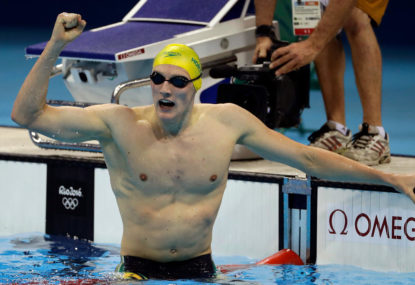'An iconic roster': LeBron, Steph, KD headline all-star cast for Team USA's shot at Olympic glory
LeBron James is going back to the Olympics for the first time in 12 years. Steph Curry is headed to the games for the…

Is the internet radicalising young Olympians? Mack Horton’s straight shooting response to questions about his warm-up incident with China’s Sun Yang on Monday ignited a media firestorm.
Within twenty four hours, American 100m breaststroke gold medallist Lily King had publicly demonised her vanquished Russian opponent, Yulia Efimova, over a doping past even more storied than Yang’s.
Perhaps more will follow, but it is doubtful either swimmer would have been so forthright without the persistent “call to arms” editorialising of increasingly influential global swimming e-zines and blogs.
The three most viewed sites are Swimming World, SwimSwam and Swim Vortex. The last-mentioned is by far the most militant in its advocacy of “swimmer rage” against not just doping, but the alleged moral torpor of governing bodies.
Swim Vortex editor Craig Lord is perhaps the most effective agent provocateur against doping regulatory inaction in the sporting world today.
His lead stories invariably characterise the IOC, WADA and FINA as a kind of evil triumvirate, or at least an irreparably compromised triumvirate, responsible for unprecedented public skepticism.
Of the other two, Swimming World is the more outspoken, though recently less strident after Rio 400m medley and 100m backstroke winner Katinka Hosszu slapped a law suit on it over doping aspersions.
All three sites are daily fodder for both coaches and swimmers wanting a daily hit of international news and gossip.
Horton’s snubbing and subsequent vilification of Yang fell short of Lord’s recent pre-Rio exhortation for “clean swimmers” to boycott races in which known drug cheats would compete. But it blew the ceiling off the Olympics’ once binding tenet of athlete avoidance of politically inflammatory statements.
At any previous Games, Horton would have been hauled across the coals for his behaviour, both by the IOC and his own team management. That this hasn’t occurred shows that sport has already been brought into such disrepute that sanctioning him risked a new low.
It now seems certain Horton will become a figurehead/leader of swimmer advocacy in the anti-doping cause, by design or not.
Yet the mood for urgent governance reform and competitive equity also has a vigilante edge to it.
Critics like Lord claim to have lost patience with the IOC’s strict legalism which guarantees dopers the same rights of appeal as civil law, yet offer no solutions beyond stiffer sanctions and better regulatory practice.
The lesson of the Lance Armstrong saga is that anti-drug rhetoric is no guarantee of presumed piety. Armstrong’s “Live Strong” franchise had kids everywhere sporting flouro wristbands touting his clean sport message.
That he and Olympic sprint champion Marion Jones, the most prominent dopers in history, were never sanctioned during competition, indicates that testing methodology and protocol keeps losing out.
Not only does testing technology lag far behind the fact, but “soft doping” issues of Therapeutic Use Exemptions (TUE) abuse and Altitude Training (AT) increasingly obscure the definition of cheating, and compromise the credibility of federations claiming to play clean.
There are winners at Rio who have doped perhaps more often than the Efimovas and Yangs, but who will never suffer any kind of opprobrium because a doctor approved it.
Current “right to privacy” legislation means no one will ever know how many “clean dopers” there are.
It is naive to expect WADA, the IOC, FINA and even CAS to reduce the legal avenues open to sportsmen, since the accused will simply go over their heads to some overarching civil jurisdiction.
The one and only route to rebuild confidence is to spend many times the dollars presently thrown at testing, however many zeros that sum is. Surely there could be a special tax on the multi million dollar incomes of athletes currently so well served by testing.